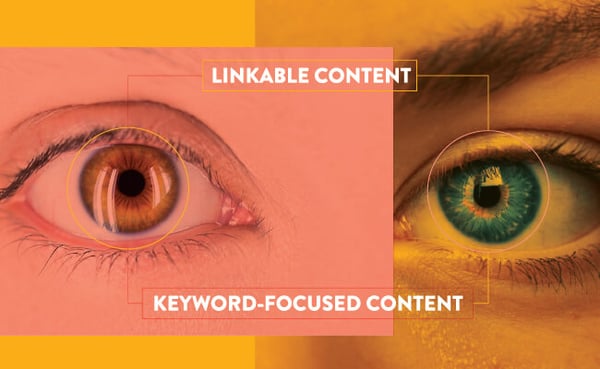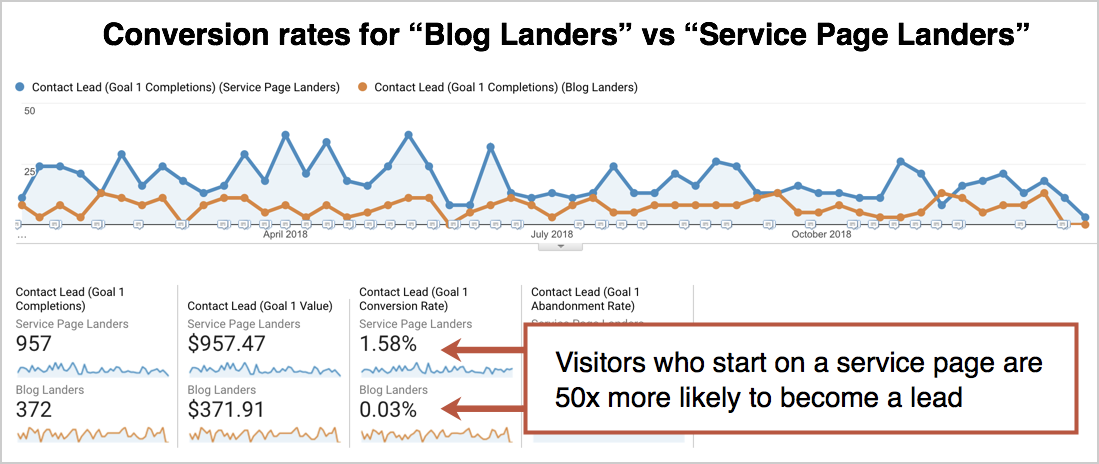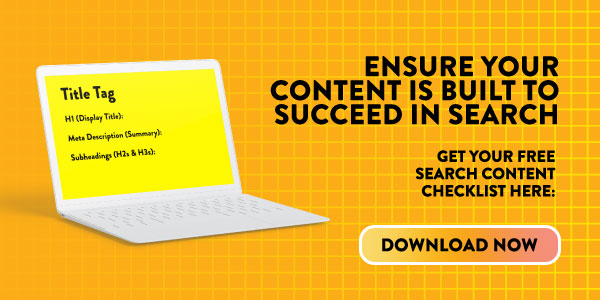We all know content is king, right? If you’ve spent any amount of time working in the SEO industry, you’ve heard Google say (in an blog, video, tweet, and the list goes on…) the best way to get your website to show up in its search rankings is to create great content that users love.
- “What’s the best way to protect yourself during a pandemic?”
- “Create good content.” – Google, probably…
In all seriousness tough, there is a reason Google harps on us about creating quality content — Google wants high-quality, useful pages in their search results because they provide a positive searcher experience.
So, at the risk of sounding like a Googler, you need to have helpful, valuable pages if you want your website to perform well in organic search. Today, I want to focus on two specific types of content that can help you achieve SEO success: linkable content and keyword-focused content.

In an ideal situation, you would create both types of pages. However, not everyone gets to operate in ideal circumstances, so I posed the question of which is more important to some of the brightest minds in SEO to hear their insights. If you want to jump straight to their responses, click here. Otherwise, I’ll walk you through these two types of content so you can understand the goals, attributes, audiences, etc. of each before diving into the expert opinions.
Let’s get started.
What is Linkable Content?
Linkable content is any page that is designed and created with the primary goal of attracting backlinks to your website.
These pages can take many different forms, but some of the common attributes of link-worthy content include:
- Broad appeal that caters to a large audience
- Engaging or entertaining format
- Informative, and supported by relevant data
- Original or unique in some way
- Comprehensive coverage of a topic
- Etc.
These characteristics are common among link-worthy pages because they contribute to the overarching goal of compelling another person to link.
However, your goal with linkable content isn’t to get one person to link, it’s to get as many (relevant) people to link as possible. This is why broad appeal is such an important attribute for linkable pages — the more people your page appeals to, the more people you can convince to link.
Since you want to capture the largest audience possible, link-worthy pages typically serve the audience that lives at the top of your marketing funnel — the broadest part of the funnel. While these people may be the furthest from conversion, they are still relevant to your business and you want to introduce them to your brand.

Furthermore, you can include appropriate internal links to your converting (products or services) pages to increase their visibility as well. Not only will these internal links provide navigation to converting pages, but they will also ensure your converting pages benefit from the link equity of all the backlinks your page earns.
To recap, linkable content:
- Is engaging, informative, unique, comprehensive, and more
- Serves a large, broad audience at the top of your marketing funnel
- And fulfills the goal of attracting backlinks to grow the authority of your website and pass link equity to important pages via internal links.
You can see an example of a linkable page on our site here.
What is Keyword-focused Content?
Keyword-focused content, as the name suggests, is any page that is designed to rank in organic search for a specific set or subset of keywords and phrases.
Pages designed with organic rankings in mind typically have:
- A narrow focus in terms of topic or subject
- A structure that answers the intent of the associated keyword quickly
- Optimized headers and sub-headers (in terms of the target keyword and phrases)
- Formatting consistent with current ranking pages
- Etc.
These are the common attributes of keyword-focused pages as their primary goal is to attain keyword rankings for relevant queries.
Struggling to create content that ranks in search? Download this free content checklist to ensure your content is built for success!
Contrary to the broad appeal of linkable content, keyword-focused content should serve a very specific audience. Consider this strategy like a business that “niches down” to serve a defined but select group of customers (E.g. a link building company vs. a search marketing agency). However, this means these pages have a smaller audience and likely won’t have many link opportunities, increasing the importance of earning organic rankings.

The specificity of keyword-focused content is what gives these pages a competitive advantage in the SERPs, diving deep into a particular topic, rather than only scratching the surface within a broader, more general page. With the right targeting, you can design these pages to earn organic rankings relatively quickly in low-competition search results, to create passive streams of qualified traffic. Of course, low-competition typically means low search volume, but if you successfully scale this strategy to target multiple keyword sets, you can build a significant amount of organic traffic on aggregate.
To recap, keyword-focused content:
- Has a narrow focus and serves a specific audience
- Is optimized for a defined keyword theme
- And best serves low-competition, low search volume keywords.
- You can see an example of a keyword-focused page on our site here.
Linkable Content or Keyword-focused Content?
So, now that you understand the goals and characteristics of these two different types of pages, which should you focus on more for your website? Which is more important?
Well, to help me answer this difficult question, I reached out to some experts from around the industry to get their opinions. Specifically, I asked them the following question:
“All things being equal, you have the ability to create a (non-product/service) page on your site relevant to your business. One page will earn links, but not rank for any keywords. The other page will not earn any links, but will rank for relevant keywords. Which page would you rather create?”
Below is a list of the experts (in the order of when I received their responses) I reached out to, and you can click their name to go straight to their response.
- Danilo Romeiro and Aleks Shklyar, iPullRank
- Andy Crestodina, Orbit Media
- Lily Ray, Path Interactive
- Jamar Ramos, Crunchy Links
- David Farkas, The Upper Ranks
- Julie Joyce, Link Fish Media
- Dr. Pete Meyers, Moz
- Nicole DeLeon, North Star Inbound
- Danny Goodwin, Search Engine Journal
- Brie Anderson, Beast Analytics
- Alexandria Heinz, Siege Media
- Jeff Russell, VMLY&R
- Kameron Jenkins, Shopify Retail
- Gisele Navarro, NeoMam Studios
- Jori Ford, FoodBoss
- Jessica Levenson, Oracle NetSuite
- Venchito Tampon, SharpRocket
- Moosa Hemani, SEtalks
- Hardik Oza, Hardikoza.com
- Anisa Awad, SSENSE
- Carla Thomas, Builtvisible




"In a perfect world, we'd like to both rank for keywords AND earn links. At iPullRank, the Content Strategists and the SEO Engineers work together to make sure that this happens all the time. But for the sake of the game, I’ll choose links. More than being the first in the SERPs, we are proud to be the ones that people quote and link back to. Also, the links will ultimately raise the site’s overall authority and boost keyword ranks for all the site’s pages. This would include pages that convert and ultimately drive new business.
Not to say that a content piece (or a page) that is worth the attention of the industry is, for me, worth more than hitting the right keywords and being on the first page for a couple of months."


“I choose to create a page that earns links.
I'll give you three reasons why...
When a page gets cited by others, that means I've successfully created something useful. It's the ultimate compliment. I have contributed to my industry and helped others.
Rankings (and traffic) to non-service pages is nice, but it does not directly correlate with the success of my business. I get a ton of traffic to blog posts. I'm happy that the content is useful to people, but it has very little impact on my business if it doesn't somehow support my other efforts (ie. attract links, subscribers, followers, word of mouth, etc.)
The links to this page may help my site become more of an authority, helping my service pages rank for the more valuable, commercial-intent keyphrases. It's these pages that drive demand.
Try this: create two segments, one for people who start on a blog post, another for people who start on a service page. Check the conversion rate for each. On our site, the conversion rate for people who start on a service page is 50x higher than people who start on a blog post.

I really like blog traffic. But I need to rank for the money phrase to drive leads and keep my 40 employees busy.”


“I had to think about this quite a bit but I’d rather build a page that earns links, not ranks for keywords.
In most cases, I believe (good) links are harder to earn than keyword rankings. Links imply that the content genuinely resonates with people, or at least gets a reaction out of them. That should be the primary goal of a content strategy.
When I write content, for example, it is usually done with the intention of generating real, authentic engagement (which usually manifests itself in the form of social media shares and links). Keyword rankings may come as a result of that but it’s usually not my primary goal.
Additionally, the value you get from the links can then be leveraged to help other pages on your site rank. Plus they help to build overall website authority.”


“Based on my digital marketing experience, and where I've seen sustained success, I'd rather have my non-product and non-service pages rank for keywords and not receive backlinks. If my content ranks well, and people click on it, the internal links I have on the ranking piece of content can point to a transactional page. Or, I can add an email sign up, contact form, or RFP to the informational page to lessen the friction to a customer action.
For a backlink to work well in this scenario, I'd need to count on the Internet searcher stumbling upon the page/site linking to mine, reading that page's content and seeing the link to my site, following that backlink to my website, reading my content, then taking action on my site. That is too many variables.
One last benefit, in my mind: if the ranking page answers a keyword query, your page could earn a featured snippet, or a "people also ask" box, in the SERPs. This puts your content in front of additional eyes, potentially increasing CTR. The more people you can bring to your site, the more potential customers you have.
Long story short: if I had to choose, give me keyword rankings over backlinks.”


“I'd go with the linkable asset, since links have the ability to have a positive impact on your entire site (and not just one specific page) and will be beneficial to your organic search visibility for the long haul.
Also, correlation studies have proven time and time again that you'll never rank without the authority that relevant links provide, so what good is an optimized page without links, anyway.”


“I'd choose a page that earns links even if it wouldn't rank well. Those links would still be links to the site as a whole which would hopefully have an overall positive impact. Those links would also provide referral traffic.”


“As a marketer, links are a means to two ends: (1) direct traffic, and (2) "authority" or link equity that hopefully drives rankings. The end-goal of (2) is also traffic (relevant traffic, ideally), so we've landed in the same spot. If the first page drives direct, relevant traffic or measurably contributes to my brand, I'll take it. If the second page drives traffic from relevant keywords, I'll take it. Practically speaking, I usually find that pages that earn links rank for keywords and the two are deeply intertwined, but if I had to pick (all else being equal), I'd probably pick the page ranking for keywords. There's likely something about that page that has staying power and if I see it ranking for a few keywords, it's probably ranking for many more that I don't see. This is a page that has the power to attract links, if I work a bit harder at it.”


“As much as I love a good link building asset and believe they are more difficult to create and promote, given this choice I'd have to go with a page that brings in relevant traffic. And while most of the time we do have to make a choice between content that attracts links or content that has search volume, it's very possible to find topics where both goals are possible with the same page. A good SEO should always look for those opportunities first.”


“I would rather create a page that will rank for relevant keywords. SEO is all about driving the right types of traffic and helping your business succeed.
Links are still super important for SEO. We all know this. But links aren’t the only factor you need to think about. There are plenty of other ways you can influence ranking beyond links, which typically are out of your control anyway.
If I’m honest – I never think about “will this get links?” I think, “is this something our audience wants, needs, or will enjoy?”
I’ve often thought of links as proof that your content is good (if not great). In other words, the links will follow the content, not the other way around. If you’re creating bad/mediocre/average content, who’s going to legitimately link to it? (Also, please don't create bad/mediocre/average content!)”


“I would likely go for a page that ranks for relevant keywords, but doesn’t earn any links. The reason being that relevant keywords, though they may potentially bring in less traffic, will be of higher intent. Just because you get some back links doesn’t mean they are from relevant sources that are going to send QUALIFIED traffic. Links aren’t always coming from the sources we choose, so there is no telling whether or not they will help us. A lot of links and no rankings could be an indicator of high bounces.”


“As with most SEO scenarios, I'd say it depends. How is the site doing as a whole?
If it's a newer site, I'd choose to create a page that would earn high-quality links, making sure that the page's internal links are set up to funnel link equity to core categories. While a single page likely won't make a measurable difference, replicating this strategy across multiple pages and focusing on building the site's authority will allow it to rank for more terms over time.
If the site is already well-established, I'd choose to create a page that would rank for relevant keywords with the goal of driving conversions.”


“If I could prognosticate the future impact for a supporting document I would choose the method that drove the most improved and consistent traffic. However, in my experience, building a page that would rank for relevant keywords will ultimately drive more organic traffic, which is likely the overall goal of that page. While building links are important for initially ranking in search results, they can have less correlation for ranking highly on the first page. There are dozens of other levers of on-page strategies that can influence the ability for a keyword to rank.”


"A page that'll rank for relevant keywords! SEO is a funnel - a series of events that should all be leading to your ultimate goal (namely, revenue for your business!). Earning links and other SEO tactics are a means to get you better exposure in the SERPs, not an end in-and-of themselves, so if I can bypass the tactic & get the result, great! But even once you're ranking in the SERPs, the job still isn't done! You'll want people to click on your result & become visitors, then you'll want those visitors to contact/purchase from you. Basically, I'm always going to choose the thing that gets me closest to my end goal."


“As you can imagine, this question could start off with a big fat 'it depends' as I wouldn't necessarily blindly recommend one option over the other to any site in any industry at any stage of growth.
BUT given that you need an answer and not a string of questions, I will pick the page relevant to my business that will earn links.
There's a few reasons why:
- The first reason is quite simple: I will be able to place internal links within this page to help push product/service pages.
- If it's truly relevant to my business, then it will help me build brand awareness within the sector I'm part of and with potential customers.
- At the same time, a good performing campaign will offer the opportunity to build relationships with sites, journalists, bloggers, influencers and webmasters that will likely want to see/share/link to my content again in the future.
- If the page covers an evergreen topic or one that could be updated on a yearly basis, then it will have potential to continue to earn links organically in the long term. Plus, I will be able to add a layer of manual outreach to promote any updates to the page and launch reactive outreach rounds that tap onto trending topics throughout the year.
- On top of all that, a page that earns solid, hard-to-get links will help increase search visibility for the site as a whole - especially if I was smart with where the page sits and the internal linking structure of the site. This means that this one page will help me sell my product/service in the long term.
- Lastly, a page that gets links and that has been optimised for search will definitely rank. I can't imagine a world where such a page wouldn't rank so I'm going to assume it does. Given that the content is relevant to my business, then I should be able to rank for relevant keywords for that page -- even if those are top of funnel terms or long-tail keywords. That means that this page is likely to become a door to my site where traffic arrives naturally.
And if all those reasons weren't enough, then I will say this:
Creating a page relevant to my business that will earn links is HARD, and it will only get harder over time.
When creating a page that will rank, I'm in control of the majority of the process. The two variables I'm not in control of are my competitors and search engine algorithms. Of course, this is an oversimplification, but in the great scheme of things there's a lot more in my control.
When it comes to earning links however, the one action that will determine whether I get a link is not in my hands AT ALL. This alone makes links so crucial for the web and so hard to come by.
If you are telling me that I've got the choice of opting for a page that will definitely earn links or one that won't, then I will always choose the links.”


“I would create the page that will rank for relevant keywords.
Simply put, it's a smarter business decision. As a business, the goal online is to connect your business to the people who will find value in it. We use methods such as SEO to do this, however, if relevant connections aren't made, the page fails to meet its purpose. If the page is non-product/service, then it's purpose should be to inform. A page that is highly relevant to users will earn links regardless. Besides that, the only reason people focus on link building is to get the page to rank for relevant keywords. If it's not going to do that, why waste precious resources building such a page?”


“Given the choice between the two options, I would rather create content that ranks for relevant keywords. A piece of content that ranks for relevant keywords has the ability to satisfy the user as well as meet business objectives like leads, downloads, impressions, etc. It also means that the content is more discoverable which means that it would have a greater opportunity to be shared on social, referenced by other content, and ultimately garner backlinks naturally/editorially. Conversely, backlinks to a subpar page that isn’t going to rank for anything relevant is less likely to help me meet business objectives. If the sites linking to mine had the ability to refer loads of traffic that could be converted, I might have a tougher decision in front of me.”


“I would choose the page that ranks for relevant keywords, though will not be able to earn any links. Business-wise, it's more practical to gain a direct value from pages that rank for keywords you're targeting - traffic and potential conversion value (as you can turn organic visitors into customers through funneling). Though the dilemma that it will not earn any links, chances are, by ranking for informational keywords, publishers and other content creators won't resist linking to the page.
Publishers who are looking for additional quotes/insights might find your page to be relevant to their works (as it ranks for referential info keywords), this gives an irresistible advantage on your page to earn links (helps you to hit two birds with one stone - rankings and link earning).”


“I loved the question and as you said, everyone wants the best of both the world but if I had to choose one, I would choose the page that might not get any links but should be able to rank for relevant key phrases.
My idea of SEO is pretty simple, for me, successful SEO is that allows businesses to reach their target audience. If the page is not getting links but ranking for relevant key phrases, it will then reach the target audience too, which is my goal at the end of the day.
If I am creating a page that offers a solution to the most painful points that the audience in the industry is looking for. If that page does not attract links but is ranking on few long-tail relevant terms, I will be happy with that as the page reaches out to the right audience who are searching for the related term and they further can share that page to their network and hopefully, my target of helping people via that page will be achieved.
If the page is not getting ranking for any relevant key phrases but getting links, what’s the point of it at the end of the day?”


“I'd go for the one that ranks for keywords because several times I have seen that linkable content doesn't always rank well in search engines. And my primary goal is to rank well for a set of keywords that can increase the traffic of the website and most likely convert them to take action like signup, call, purchase, and so on.”


“In an ideal world, I would want to create the most perfect web page that ranks in the first page of search results and earns top quality links from the likes of New York Times and Vogue. This page would generate clicks and conversions from the get-go and enter the hall of SEO fame. But we do not live in an ideal world. And that’s okay, because SEO at its core is all about continuous optimization and learning by doing. I was presented with quite the question that this post will attempt to answer with various expert opinions and insights. Ultimately, there is no right or wrong answer. And as any seasoned SEO will tell you ‘it depends’ which became the inside joke of our industry, but that phrase truly encompasses the complexity of SEO and its dependency on a combination of factors. With this dilemma in particular, my answer kept changing the more I analyzed and dug deeper into various scenarios: how established is the business? What type of industry does it operate in? B2B or B2C? What type of informational (non-product) page am I creating? How high would the page rank in search results? What type of links would it earn and how many? And the list of hypothetical questions keeps on going. For simplicity purposes, I will answer it with a more generic approach in mind.
All things being equal, I would prefer creating a page that ranks for relevant keywords even if it will not earn links. That’s not to discount the need for a solid backlinking strategy as part of a balanced approach of on-page and off-page optimizations. I’m a big advocate for earned links and have seen its impact in influencing ranking positions if done consistently and correctly. But ultimately, SEO is for the people whether we want to call them ‘customers’, ‘users’, ‘buyers’ - they’re all looking for information and use search engines like Google to find answers. Ranking the page for those relevant keywords means that they will be able to discover the site’s content through organic search results. Additionally, SEO performance is measured through organic traffic and revenue. Therefore, I will be able to attribute the traffic generated from the page’s rankings to the SEO tactics including technical and on-page optimizations. On the other hand, the traffic to the page that will earn links but will not rank for any keywords (assuming that those links will result in site visits) will be attributed to referral traffic, which might affect the business perception of SEO benefit in generating qualified leads as it will become harder to quantify and validate the tremendous financial value of SEO.”


"When thinking about how best to answer this question, I thought about the importance of both keywords and links working in synergy. But if I had to choose, it would be the page that doesn’t earn any links but will rank for relevant keywords.
More often than not, a major goal or measurement for success in a link building campaign is whether it results in ranking uplift anyway. It’s also vital to remember you can’t always choose link sources, and you’ll be restricted to the audience of where your links are placed, which may not always resonate with your own goals. Keyword targeting, on the other hand, gives you more control and allows you to incorporate the searcher’s intent.
Traffic is almost always guaranteed when you’re ranking highly in the SERPs for terms with substantial search volume behind it. Backlinks, however, don’t guarantee traffic. Their unique benefits are rooted in helping the improvement of a site overall. So, if you’re faced with the decision of ranking or backlinks, it’s important to factor in your site’s current condition and your wider goals, as link building may be the better choice.
If you’re building links to a page that never ranks, link from there to a priority product page and channel that valuable link equity through to it. If you build a non-product page to rank, then you’re building authority around the topic. That page should also link through to the product page and pass relevance.
Content doesn’t climb the SERPs by accident purely due to visibility or just placing keywords within the content. Great content is optimised, keeps readers engaged and offers interesting insight. If your content fits these three things, link should follow."
You can see why this is such a nuanced question, as we have varying opinions and great points being made on both sides. I appreciate these experts taking the time to answer an admittedly subjective question, to give us more perspective and understanding on why each type of content is important.
Final Thoughts
The question of which is more important between linkable content and keyword-focused content is intentionally difficult and subjective — the truth is you need both.
But since I didn’t let the other experts give this answer, I will “pick a side” here as well.
My opinion is that linkable content is most important because it supports the legitimacy and authoritativeness of your site, and at the end of the day, Google’s algorithm is still built on links as a signal.
So, if you want sustained rankings and long-term visibility in organic search, you’re going to need backlinks. Furthermore, links were useful before search engines as a fundamental part of the web — links provide direct pathways to your site, which helps you avoid putting all your eggs in the “search basket”.
Again, a comprehensive SEO strategy should include both linkable and keyword-focused content in a ratio that makes sense for your site and business. But I wanted to pose this question because it is one you should be asking yourself before you create a new page, as it will force you to think long and hard about your website’s goals and if your content is serving those goals.
I hope the information shared here helps you better understand the different types of content your website needs to be successful in search and empowers you to build an effective content strategy that supports your SEO goals.


